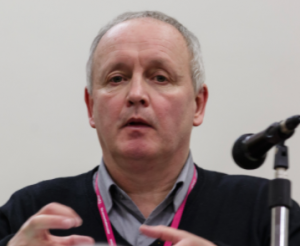Online Engagement Festival: Day Three – Climate Change Is a Worker’s Issue
Union Matters September 30 2020
Wednesday 30th September 2020
Climate change is a health and safety and workers’ rights issue, CWU members and Ed Miliband said today.
Opening up the session at the CWU’s Online Engagement Festival, CWU senior deputy general secretary Tony Kearns outlined the CWU’s approach to climate change.
Describing the dramatic rise in carbon dioxide levels and the global temperature in the last 35 years, he set out some of the problems the world will face, such as global food supply shortages, an increase in world migration, battles for natural resources, and a rise in global pandemics.
He outlined a just transition to a fully decarbonised economy, and how it must be “just for the workers”.
He said: “We can either sit back or let businesses force this on workers or we can set the agenda ourselves. That means CWU must have our own policies and approach to dealing with it.”

Tony Kearns
Tony’s point was concurred with by Derek Maylor, who said that climate change “is a health issue, so it’s a trade union issue by default. It is too late now for fancy speeches – we need good actions.”
Tony Pedal also reminded viewers that action over climate change must also attack companies, not governments, criticising the way that corporations sometimes offer “token gestures” against climate change because it’s the “flavour of the month”.
TUC health and safety officer Shelly Asquith initially focused on coronavirus, pointing out that hospitals are already shutting down to deal with the extra capacities demanded by a wave of new coronavirus patients.
She accused the government of prioritising “profit over people”, saying that “this has resulted in the deaths of thousands of workers that could have been avoided, and will sadly likely result in thousands more.”
Criticising the government’s inability to raise statutory sick pay to more than £95 a week, Shelly pointed out that a TUC survey found that 40% of workers said they would be in “severe” financial hardship if they contracted coronavirus or had to self-isolate after being in contact with someone that had it.
She also warned that in the survey, 54% of workers claimed that social distancing was not practiced in their workplace, 62% don’t know if their managers have conducted workplace safety assessments, and 58% say that their workplace PPE is inadequate.
On a more positive note, Shelly added that there are approximately 120,000 health and safety reps across the TUC-affiliated unions, a number which has grown throughout the crisis.
She also said that the crisis has shone “greater consideration” in the political world about “certain damaging aspects of our economy, and the ways we work which contribute to climate disaster”.
She said that political tools such as economic intervention and the nationalisation of certain industries must be encouraged, saying that “this wakening has to be used to be our movement – use the consciousness to take these existing demands.”

Ed Miliband at CWU Online Engagement Festival
Labour shadow business secretary Ed Miliband then joined viewers to “talk about climate change in a bigger context”.
After saying that “it’s never too early to start thinking about the sort of society you want to build” after a crisis is over, Ed argued that the pandemic has shown that there is a gap between “what the market values” and what work is valued by the rest of society.
In times of crisis, he argues, “heroic governments” of the past “haven’t lowered their sights about what we need to do. They’ve raised their sights – they’ve said we had a massive new society to build”.
After warning that the United Nations have said we have ten years to “turn around” the climate crisis, Ed emphasised that the climate crisis is “not some abstract thing happening in the future, it’s happening now”, referencing last year’s floods in south Yorkshire, fires across California, and significant temperature rises across the Indian subcontinent.
He said that already existing environmentalist movements are “too much of a middle class movement”, and urged them to be relevant to the people who are “not worried about the end of the world but worried about getting to the end of the week.”
In terms of political power, Ed demanded that any government “think big”. Positively referencing American president Franklin D. Roosevelt’s attempts to build a Civilian Conservation Corps which employed millions of infrastructure labourers during the Great Depression, he said that this reflected a “big vision” about “what kind of society we can be and the jobs that people can do”.
Ed also insisted that new green jobs must be “unionised jobs, well-paid jobs, jobs with proper rights, because – let’s be honest – some of the fossil fuel jobs have those attributes, and we can’t tell people in those industries that there will be a transition that will be less pay, less rights, no union.”

